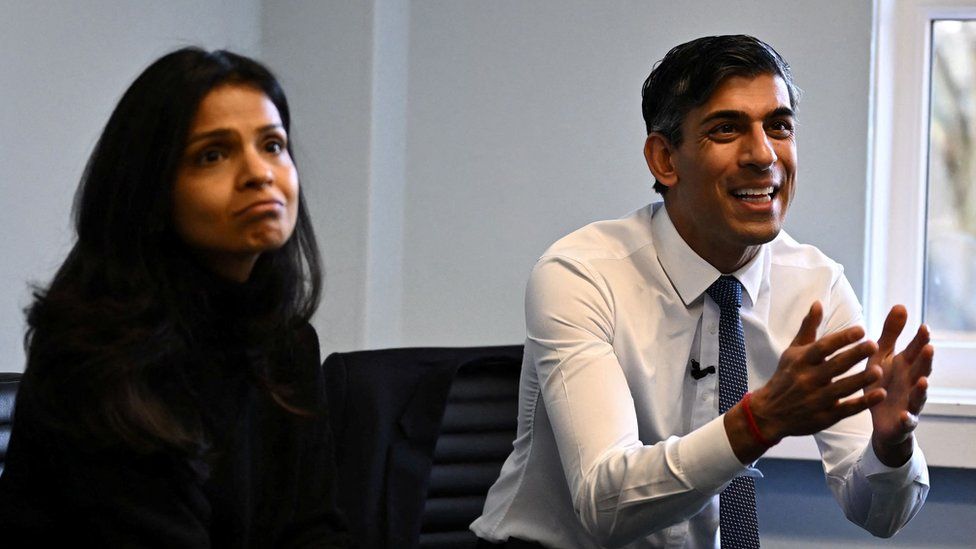ARTICLE AD BOX
 Image source, Reuters
Image source, Reuters
Rishi Sunak has faced questions over shares held by his wife, Akshata Murty
By Phil Kemp & David Wallace Lockhart
BBC Politics
The chair of an influential committee of MPs has called for a "radical overhaul" of how government ministers declare their outside interests.
Chris Bryant, the chair of the Commons' Standards Committee, told the BBC that the current system is "not fit for purpose" and that he has concerns about transparency.
The Labour MP added that he was unclear why certain interests that are flagged to civil servants are never made public.
But the prime minister's ethics advisor, Sir Laurie Magnus, has said an "excessive degree of intrusion" should be avoided.
So who decides what the public has a right to know about?
Whenever an MP becomes a minister or moves department, they must complete a declaration of all interests form including anything that might be thought to give rise to a conflict.
These declarations are treated in confidence, including matters that may not be relevant.
The BBC asked to see a blank copy of this form using freedom of information laws but the Cabinet Office refused the request on the grounds that ministers had to have confidence the process was confidential.
This form is then shared with the relevant permanent secretary, the most senior civil servant in that government department, who advises on any action that needs to be taken.
The independent adviser on ministers' interests - sometimes called the prime minister's ethics advisor - then finally advises on what it is necessary to publish as part of the list of ministers' interests.
Only interests that are, or may be perceived to be, directly relevant to a ministers' responsibilities are made public.
According to the ministerial code, the list should be updated twice a year.
But until this week, the most recent version was nearly 12 months out of date and included ministers who had since left office.
This led to accusations the prime minister had not been transparent about the stake his wife held in a childcare agency which could benefit from announcements made in the March budget.
Because not everything a minister declares as a possible interest makes the published list, they can get into hot water if something that hasn't been made public then makes it in to the newspapers.
This happened when reports revealed Mr Sunak had held a US green card and that his wife had claimed non-domicile status, both while he served as chancellor.
Mr Sunak asked the then Prime Minister Boris Johnson for a review of all his declarations since becoming a minister in 2018, saying that "all relevant information was appropriately declared".
He was subsequently vindicated by the independent adviser on ministers' interests, Lord Geidt, who concluded that he had been "assiduous" in meeting his obligations.
Trusting ministers?
Lord Geidt revealed that Mr Sunak had, in fact, declared both interests when he joined the government in 2018 but they had not been included on the published list because they were not deemed to be directly relevant.
"The list does not include every interest that a minister has declared; it is not a register," he declared.
So while Mr Sunak could claim all the information had been appropriately declared, that did not automatically mean it had been included in the published list.
In that sense, we as taxpayers are being asked to trust that ministers and officials will let us known that an interest will be declared once it becomes relevant.
This could be why the most recent list includes a reference to the prime minister's wife's "direct shareholdings" when previous versions have omitted this.
But no explanation is offered for this and Downing Street has not provided details about when the interest was first declared.
Trusting ministers to be forthcoming with their declarations, however, has not always worked.
'Opaque'
In January, Nadhim Zahawi was sacked from his job as a minister because he failed to declare interests that might have been thought to have given rise to a conflict.
Sir Laurie Magnus said Mr Zahawi should have declared that he was under investigation by the tax authorities and that he had subsequently had to pay a penalty.
The public only got to know about this through the work of journalists and campaigners.
Boris Johnson also faced questions about his declarations when the Sunday Times reported he took an £800,000 loan guaranteed by a Canadian relative Sam Blyth.
The newspaper said Mr Johnson was told he could take out a loan without declaring it on the list of ministers' interests as long as his guarantor had no "business or personal interests in the UK" beyond his family ties.
But the Sunday Times reported that Mr Blyth was on a government list of recommended candidates for a job as the chief executive of the British Council.
A spokesman for Mr Johnson has previously said all his financial arrangements were properly declared and registered on the advice of officials.
Opposition voices want to see the system changed.
Chris Bryant told the BBC: "This is all far too opaque, with a veil drawn over vital details. The whole system needs a radical overhaul."
Labour have called for an Ethics and Integrity Commission "to restore the standards in public life", and the Liberal Democrats have called for ministers' interests to be brought in line with those of MPs, which are published every fortnight.
The party's chief whip Wendy Chamberlain said: "It's outrageous that there is more transparency for backbench MPs than for government ministers."

 1 year ago
25
1 year ago
25








 English (US) ·
English (US) ·